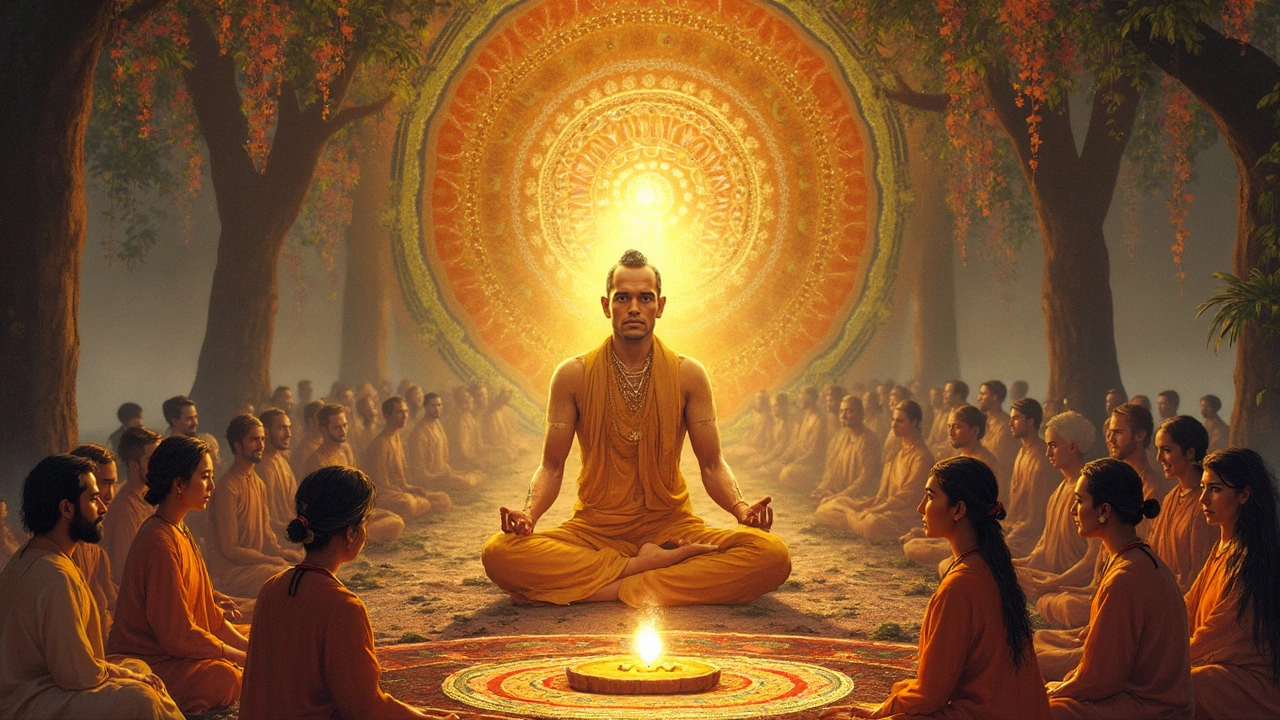
When you think about India's spiritual philosophy, you're diving into a vast ocean of wisdom. It's not just about meditation or yoga, though those are definitely parts of it. Indian spirituality is like a giant, interconnected web that touches on how we see ourselves, others, and the universe around us. It's a philosophy that's been around for thousands of years, and it still feels pretty relevant today.
At the heart of this philosophy are the ancient scriptures like the Vedas and Upanishads. These texts are all about exploring big questions: Who are we? What's our purpose? What's the nature of reality? But Indian spirituality isn't just about reading old books; it's about living those teachings every day. It's fascinating how concepts like karma or dharma have woven their way into everyday conversations, right?
And let's not forget about mindfulness and meditation. These practices, rooted in this very philosophy, are now global hits. They've made their way into wellness apps, yoga studios, and even corporate boardrooms. But in India, they're more than just calming exercises—they're paths to deeper awareness and balance in life.
- Foundation of Indian Spirituality
- Core Concepts and Beliefs
- Influential Texts and Teachings
- Practical Tips for Incorporation
Foundation of Indian Spirituality
When you're trying to understand the roots of Indian spirituality, you can't ignore the ancient scriptures and texts that have shaped it. Think Vedas, Upanishads, and even the Bhagavad Gita. These aren't just books to read once and forget—they're more like guides on life's journey.
The Vedas, for example, are among the oldest sacred texts in the world. Written in Sanskrit, they explore hymns, philosophy, and guidance on rituals. They lay the groundwork for concepts that are foundational to this philosophy, like karma, dharma, and moksha. These ideas ask us to think about our actions, responsibilities, and ultimate liberation, respectively.
Moving to the Upanishads, they take a deep dive into spiritual knowledge and wisdom. Here’s where the concept of 'Brahman' pops up a lot. It’s this idea that there’s a universal spirit, a kind of ultimate reality. Also, the Upanishads introduce us to the notion of ‘Atman,’ or the soul. Sounds deep, right? But it really boils down to the connection between your inner self and the universe.
Then there's the Bhagavad Gita, a part of the epic Mahabharata. It’s a conversation between Prince Arjuna and Lord Krishna, bringing insight into duty, righteousness, and devotion. It encourages readers to find a balance between worldly duties and spiritual growth.
Here's a fun fact: According to data collected by Indian spiritual communities, an estimated 60% of spiritual practitioners believe the foundational concepts of these texts are more relevant today due to modern life's complexities. Though ancient, these principles continue to help people find balance and purpose.
Core Concepts and Beliefs
India's spiritual philosophy is a rich tapestry of ideas that have been woven together over thousands of years. At its core, it's about understanding life, the universe, and our place within it. Let's break down some of the essential ideas that shape this profound perspective.
The Cycle of Karma
One of the most well-known concepts is karma. In simple terms, it's the idea that our actions have consequences, and this extends beyond just the immediate future. The ripple effects of what we do can influence future lives, suggesting a bigger picture of moral cause and effect. Actions done in this life can shape the circumstances of another life, making every decision significant.
Dharma: The Path of Righteousness
Dharma is another key piece. It refers to the ethical and moral principles that guide our lives. It's about doing the right thing based on universal values but also fitting with one's role in society and individual nature. It's like a personal compass helping to navigate through life while keeping harmony with everything around us.
The Eternal Soul: Atman
In Indian spirituality, there's a strong belief in the soul, or Atman, as an everlasting entity. This soul is distinct from our physical being and eternal. The ultimate goal is for this soul to be united with the supreme consciousness or Brahman. The journey to this realization is seen as life’s true purpose.
Maya and the Illusion of Reality
Ever heard that reality isn't quite what it seems? That's where the concept of Maya comes in. It refers to the belief that the world we perceive is actually an illusion, and true understanding lies beyond it. The aim is to look past the illusions and see the universe for what it truly is.
"The real voyage of discovery consists not in seeking new landscapes, but in having new eyes." – Marcel Proust
This aspect of spiritual philosophy encourages us to seek wisdom and clarity within, promoting self-discovery as well as enlightenment.
The spiritual philosophy of India offers wisdom that goes beyond day-to-day living. It's not just about knowing these concepts but integrating them into life, making every thought and action more meaningful. By embracing them, we can nurture a deeper understanding of the self and life overall.

Influential Texts and Teachings
Diving into the spiritual philosophy of India, some texts have shaped not just Indian thought but global perspectives on life and spirituality. These texts aren't just dusty old tomes; they're living guides that have influenced millions.
The Vedas: Foundation of Indian Wisdom
The Vedas are among the oldest spiritual texts in the world, believed to be over 3,000 years old. Comprising four main texts—Rigveda, Samaveda, Yajurveda, and Atharvaveda—they cover everything from hymns and rituals to philosophies that lay the groundwork for Indian spiritual thought. They're less about rigid doctrines and more about inspiring a search for truth.
Upanishads: The Quest for Understanding
If you're looking for something a bit more philosophical, the Upanishads are right up your alley. These texts emerge as a continuation of Vedic thought, homing in on meditation, morality, and the nature of the divine. They encourage introspection and understanding the self's true nature, which echoes in various contemporary spiritual practices.
The Bhagavad Gita: A Guide to Life
The Bhagavad Gita, often just called the Gita, is like a spiritual guidebook. It's part of the epic Mahabharata and focuses on the dialogue between Prince Arjuna and Lord Krishna, discussing duty, morality, and the path to spiritual fulfillment. What's fascinating is how this text merges ethics, spirituality, and practical living.
Yoga Sutras: Path to Personal Growth
Then there's the Yoga Sutras of Patanjali, a roadmap to mastering the mind. It's not just about physical postures; it's about understanding and controlling your thoughts and reactions. This has huge implications even today as mindfulness becomes more mainstream.
These texts, rich with ancient yet timeless wisdom, are pillars supporting the heavily layered Indian spiritual philosophy. Whether you're looking to improve your life or seeking deeper existential answers, these scriptures provide insights that have stood the test of time.
Practical Tips for Incorporation
So, you're curious about how to weave the spiritual philosophy of India into your daily life? It's all about making small, meaningful changes that tap into the depth of Indian wisdom.
Start with Mindfulness
Mindfulness is a cornerstone of Indian spirituality. It means being present in every moment. How can you start being more mindful? Try setting aside just five minutes in the morning to sit quietly and pay attention to your breath. You'd be surprised by how calming it can be.
Embrace the Idea of Karma
The concept of karma teaches us that our actions have consequences. Want to put this into practice? Focus on creating positive outcomes in your interactions. Simple acts of kindness can go a long way and create a ripple effect of positivity.
Daily Meditation Routine
Meditation doesn’t have to be a long, daunting affair. Even a short, daily practice can help you reconnect with your inner self. An effective way to start is by dedicating ten minutes before bed to reflect on your day and express gratitude.
Nurture Your Spiritual Knowledge
Dive into India’s rich spiritual texts. Consider reading a passage from the Bhagavad Gita or one of the Upanishads. If reading isn’t your thing, there are plenty of podcasts and audiobooks out there. This habit helps nurture a deeper understanding and connection to these timeless teachings.
- Pick a quiet spot at home and create a peaceful space for reflection.
- Use guided meditations available online to help you get started.
- Join a local meditation group or virtual community to stay motivated.
Ultimately, incorporating these tips into your life isn't about radical change. It's about creating small, sustainable habits that reflect the depth of Indian wisdom and bringing a bit of that ancient magic into your day-to-day routine.